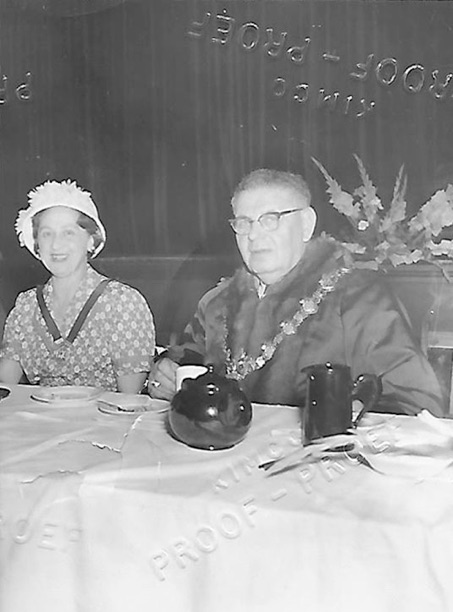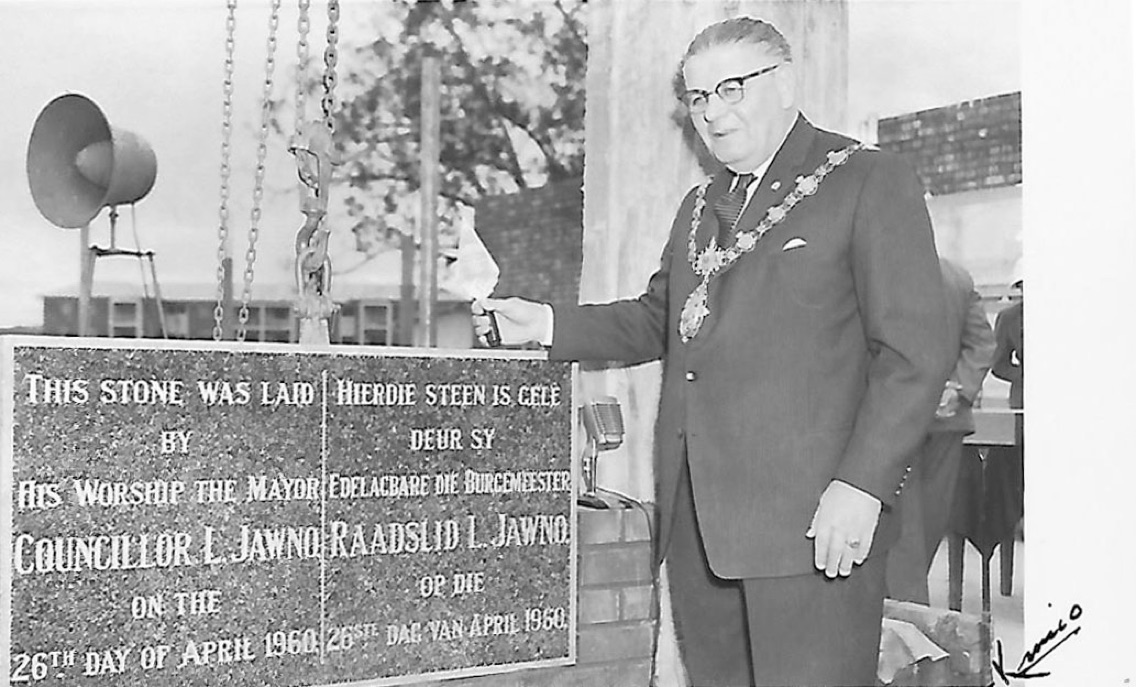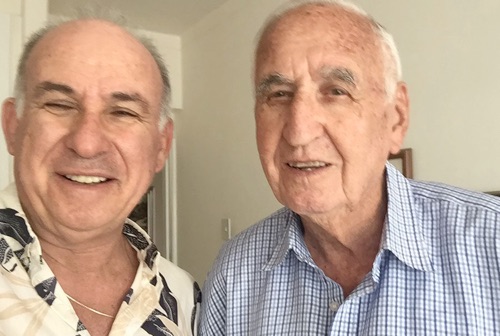Kimberley, South Africa


Jawno, Lionel

Lily & Lionel Jawno
Lionel Jawno
Year born: 1900, Shavel, Lithuania
Came to Kimberley: 1912
Siblings: Samuel David, and 5 other siblings. Sam’s son Norman who ran Carlton Furniture in Kimberley was Lionel’s Nephew.
Married: Lily Diamond, daughter of Abraham and Rachel Diamond of Brakpan. Lily and Lionel were married in September 1939 just before the war.
Lionel and Lily were Mayor and Mayoress of Kimberley 1959 - 1961
Children: Milton, Shelly (Catzel), and Brian (deceased 2016)
Milton and Brian went to CBC. They joined the family firm started by Lionel in 1931 in De Beers Road. Milton in the furniture side Advance Furniture (now lives in Jerusalem 2018) and Brian (who moved to Cape Town) was in the transport side, Advance Removals

Milton writes about his father
Lionel Jawno Kimberley Pioneer, 1900/1971
Lionel Jawno was born circa 1900 in the city of Shavel, Luthania. He was the youngest of seven siblings who arrived in Kimberley circa 1912. On arrival the new immigrants first lived in Barkley road next to the black township, then called the location.
Poverty and hunger was not unknown to the Jawno family although never spoken about. I remember my father telling me how as children they once received an orange which had to be divided eight ways, so all the family got a taste.
My father went to what was then called the free school where he learnt to speak English (Yiddish being their home language.) I can remember a friend from his free school days called Boetie Jacobs, a very simple man who was a SAR boom operator and my father was then the Mayor of Kimberley. They remained life-long friends. Lionel was a very modest man all his life.
He had to start looking for work early in life to help put food on the family table. One of his first jobs was working for Mr William Benbow Humphries who was a millionaire art collector who travelled the world collecting art after the great war and my dad had to unpack his crates of art. Later during the great depression, Mr Humphries rented my father a small store off the market square at a reduced price and he sold a few basic groceries to earn a few pennies. In appreciation of this help, which was really not so much help but self-interest as no one wanted to rent the place in the midst of the great depression, my father later donated a huge magnificent Cape Dutch stinkwood cabinet to the William Humphries Art Gallery in honour of old man Humphries, and it can be seen by anyone visiting the gallery to this day.
Another story my father told me from the early days was how the Great Flu pandemic hit Kimberley in 1918 and the neighbours died during the night and early the next morning a red piece of material was hung from a broomstick so that a hand-pulled wagon could come by and collect the dead. Amongst those affected were Jews, who were buried in the old Stead St. Jewish cemetery. (In 1976, I was a member of the Jewish Board of Deputies for Kimberley and Gus Saron, the author of The Jews in South Africa, came to visit me and we visited the graves of Jewish flu victims, many of whom were small children.)
During the early 1930's Lionel and his brother-in-law Laz Barnett, a veteran of the great war who survived the battle of the Somme, (Laz was married to Lionel's sister Frieda) received in Kimberley the great Jewish leader and modern-day prophet Zeev Jabotinsky. Jabotinsky went to stay and rest in Barkley West at the local hotel which was owned by the Millin family, a Jewish family whose daughter was the world-famous writer, Sarah Gertrude Millin.
My father and Laz Barnet went every day for a week to take a copy of the newspaper and to see that Jabotinsky was well and cared for. This was in an age when there were no proper roads, only numerous farm gates and tracks. I recall that in 1956 Menachem Begin, the future prime minister and leader of Israel, had dinner with my father and mother Lily at our home. This was because of my father's friendship with Rosh Betar, Jabotinky many years before. My father remained a disciple of Jabotinsky all his life. This was not well received by the then leaders of the Kimberley Jewish community who, to put it mildly, were not supporters of Jabotinsky and ostracized my father for his views.
Much can be written about Lionel's early years in Kimberley but suffice it to say that he never forgot that Kimberley was a city of refuge and a new beginning for him and his family. This, I believe was the reason he decided to repay Kimberley's citizens regardless of colour, creed or religion with unstinting service in his later years and believe me this he did.
Perhaps Lionel's life and times can best be encapsulated by the words that I wrote on his tombstone. "A selfless man of deeds." He passed away in 1971 and is buried in the Kimberley Jewish cemetery.
Milton Jawno, December 2017, Jerusalem.
PS: My late father Lionel told me many years ago that during the second world war the then balabatim of the shul took all the old records stored in a few cardboard boxes and gave same away to the war effort for collecting old paper waste. Thus, were destroyed priceless records and community history dating back to the very early years. This will then explain why we have no records of the past except our memories to go by.
Post script from Geraldine:
I have just been reading essays by Dan Jacobson from the 1950s. In one he recollects (as a boy of 8) meeting Jabotinsky in 1938 when he visited Kimberley – as referred to by Milton above. The great man had lunch in the spruced up and shining Jacobson house. His father, Hyman Jacobson, was also a passionate ‘New Zionist’ or ‘Revisionist’. He was responsible for organising Jabotinsky’s visit. As Milton says – Jacobson and the other three or four ‘New Zionists’ who had given him some help (eg Lionel Jawno and Laz Barnett) were shunned by the ‘Old Zionists’. Dan says, his father, when his views were known, was ostracised, had to give up the communal positions he had previously held, and certain leading communal figures would not greet him when he passed them in the street. The non-Jewish mayor at the time accepted Jacobson’s invitation to meet the famous visitor at the airport and Jabotinsky addressed a full house at the City Hall, in a meeting that Jacobson had organised and publicised in the local paper and by distributing leaflets. After that, instead of going straight to Cape Town, Jabotinsky asked to rest for a while and reflect and chose Barkley West, 20 miles out of Kimberley on the Vaal River for this.

Eli with Norman Jawno, Sea Point Cape Town, February 2018


